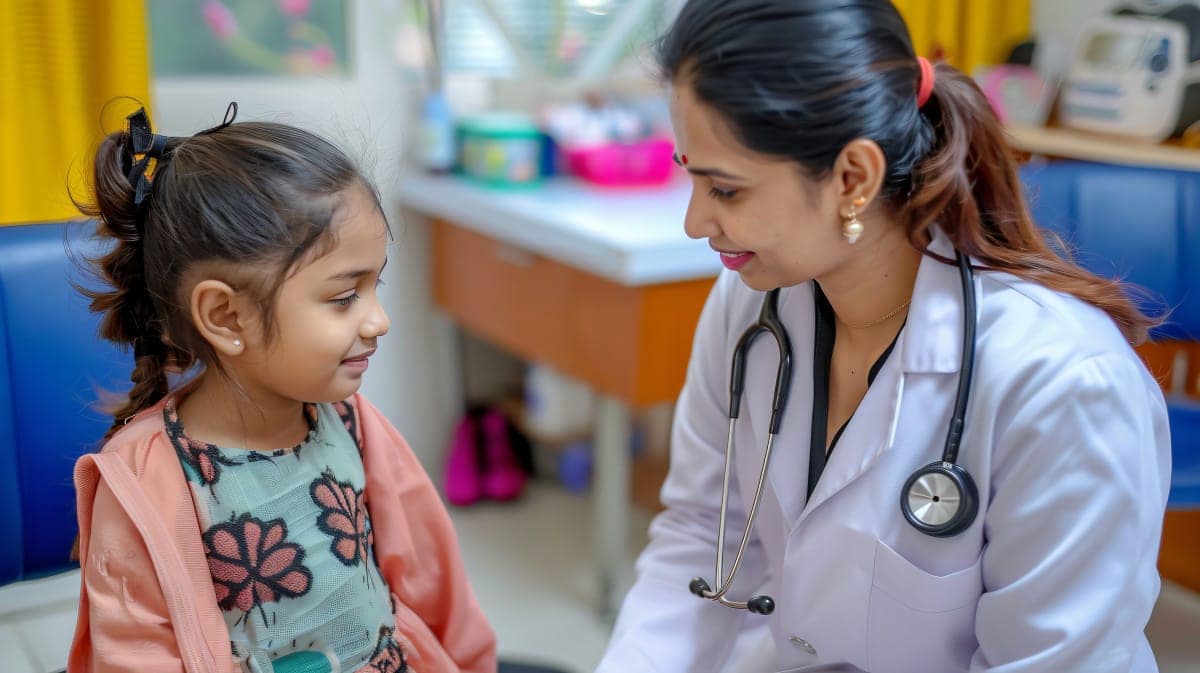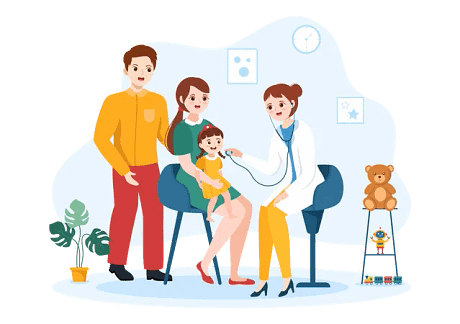
What to Expect During Your Child’s Eleventh Well-Child Visit (36 Months)
As your child reaches 36 months, this well-child visit is essential for assessing their growth, development, and health. Here’s what you can expect during this important appointment:

40 Key Points to Expect During the Eleventh Well-Child Visit
- Identify New Risk Factors
Begin by identifying any new risk factors related to the child or parents (Refer to Appendix 1). - Dietary Assessment
Discuss the child’s diet in terms of quantity and quality. Inquire about breastfeeding and observe feeding behaviors if concerns about food fussiness arise. Ask about food safety practices (Refer to Appendix 6). - Toilet Training Concerns
Address any concerns regarding toilet training. - Screen Time Inquiry
Discuss the amount of screen time the child has been exposed to (Refer to Appendix 8). - Sleep Hygiene Discussion
Assess the child’s sleep hygiene practices, referring to Appendix 9 for guidance. - Childproofing Assessment
Discuss childproofing measures in the sleeping area, play area, furniture, and outdoor spaces. Evaluate the safety of toys and any safeguards in place (Refer to Appendix 5). - Growth Measurements
Measure the child’s weight, length, and head circumference, then plot these measurements on the growth chart. - MCP Card Review
Check the completed MCP card (Green/Red zone). If it’s not completed, assist the parent in filling it out and interpret the results together. - Vision and Hearing Concerns
Inquire about any concerns regarding the child’s vision or hearing. - Daily Living Activities Involvement
Ask if the child is actively involved in feeding, dressing/undressing, bathing, grooming, and other daily living activities. - Quality of Attachment Observation
Observe the quality of attachment and the parent’s responsiveness to the child’s cues and movements (Refer to Appendix 2). - Parent-Child Interaction
Assess the child’s response to the parent leaving and returning (Refer to Appendix 2). - Play Observation
Observe the parent’s spontaneous play and interaction with the child. If parents do not engage, suggest a play activity from the CCD card. Note how parents communicate, demonstrate love, and comfort the child after immunization. - Previous Visit Review
Review notes and specific instructions from the previous visit to track progress. - Staff Checklist Review
Evaluate the completed checklist from office staff to focus on essential points during the visit. - Health Concerns Inquiry
Ask the parents if they have any health concerns regarding their child. - Behavioral Concerns Discussion
Inquire about any concerns related to the child’s behavior and how the parents are addressing them. - Response to Non-Acceptable Behavior
Discuss strategies for responding to non-acceptable behavior (Refer to Appendix 10). - Parent-Child Play Interaction
Explore how both parents engage in play with the child. - Parent-Child Communication
Discuss how parents converse with the child. - Eliciting Smiles
Ask how parents get their child to smile and engage. - IAP-PSQ-4 Assessment
Conduct the IAP-PSQ-4 assessment at the end of the consultation (Refer to Appendix 3). - Growth Chart Interpretation
Interpret the updated growth chart to assess development accurately. - General Physical Examination
Perform a thorough physical examination, looking for signs of anemia, rickets, and the eruption of teeth. - Systemic Examination
Conduct a comprehensive systemic examination to ensure all organs are functioning correctly. - Neurodevelopmental Assessment
If issues are identified on the MCP card, perform a neurodevelopmental assessment. - Vision Assessment
Check for squint and red reflex, especially if it has been a year since the last evaluation. - Hearing Assessment
Assess hearing by noting whether the child follows age-appropriate commands given at different distances and intensity (whispering and conversational voice). - Neglect and Abuse Screening
Look for red flags indicating neglect or signs of physical, emotional, or sexual abuse (Refer to Appendix 4). - Immunization
Administer any required immunizations to ensure the child’s vaccination schedule is up to date. - Support for Healthy Feeding
Provide support for continuing responsive feeding and breastfeeding. Encourage self-feeding with finger foods during family mealtimes, allowing messiness and spillage. Explain the benefits of a proper diet while discussing the consequences of inadequate nutrition. Advise against junk food and sweetened beverages, especially during illness. - Developmental Milestones
Assess development according to the stimulation MCP card, ensuring it aligns with the child’s age band. - Anticipatory Guidance
Offer guidance for recognizing and responding to verbal, non-verbal, and emotional cues. Help the child with self-regulation of inappropriate behavior through appropriate tone, body language, and facial expressions. - Encourage Active Play
Encourage taking the child to the playground for supervised activities with peers (junior swings, slides, climbing frames). Promote activities like climbing up and down stairs, jumping, and dress-up play. Provide thick crayons for scribbling, drawing lines and circles, and finger painting. Use play dough, blocks, nesting toys, simple wooden board games, and encourage pretend play with dolls or soft toys. Engage in simple games that follow rules (hide and seek, catch) to promote problem-solving skills. - Communication Skills
Encourage the child to express needs using 2-3 word phrases and teach the names of smaller body parts, especially during bath time. Foster to-and-fro conversations about the child’s interests, daily activities, and feelings. Read nursery rhymes and engage with storybooks or picture books, encouraging pointing at pictures. - Promote Independence
Foster a sense of independence in daily living activities (feeding, dressing, bathing) and involve the child in household chores (washing vegetables, putting clothes in the laundry bin). - Preventive Health Care
Discuss personal hygiene practices and care for skin and teeth (Refer to Appendix 7). - Accident Prevention
Emphasize preventing accidents resulting from falls, burns, choking, poison hazards, and electrical safety (Refer to Appendix 5). - Recognizing Danger Signs
Educate parents on recognizing danger signs that require seeking medical attention. - Next Immunization Discussion
Talk about the next immunization and its importance in maintaining the child’s health.
This visit focuses on ensuring your child’s continued growth, development, and well-being. By following these guidelines, you can actively support your child’s health and development as they explore and learn about the world around them.










































